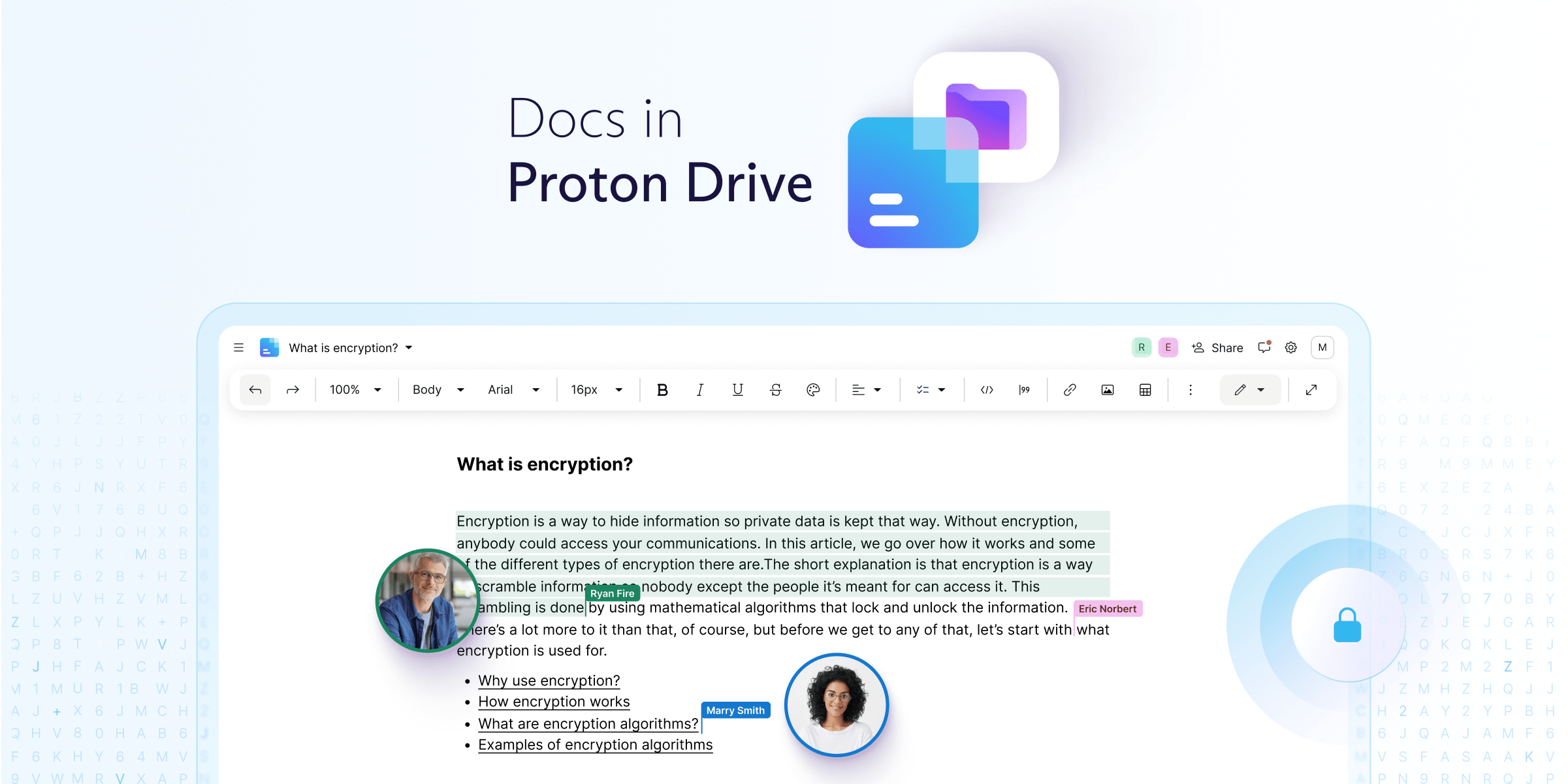- cross-posted to:
- privacy@lemmy.ml
- privacyguides@lemmy.one
- technology@beehaw.org
- cross-posted to:
- privacy@lemmy.ml
- privacyguides@lemmy.one
- technology@beehaw.org
wake me when we can use them as a saml provider
Doesn’t appear you can do anything of that via the Drive mobile app. Maybe one day they will make that possible.
If they can ever get a spreadsheet application I could fully get away from Google for that kind of thing without losing out on anything I care about.
Is this meant as a Proton Notes equivalent ?
No, but they’ve recently acquired standardnotes
Just tried it out with my proton account. Looks great! It’s very simple, but I also like that about it. And of course being private is wonderful.
How is it private?
Today we’re announcing a new end-to-end encrypted, collaborative document editor that puts your privacy first. Docs in Proton Drive are built on the same privacy and security principles as all our services, starting with end-to-end encryption. Docs let you collaborate in real time, leave comments, add photos, and store your files securely. Best of all, it’s all private — even keystrokes and cursor movements are encrypted.
Literally the second paragraph of the post (but I’m sure you haven’t read it, since you seem so busy replying to every comment here about how Proton is becoming Microsoft or something).
So sending a company your private key and trusting their servers to do E2E encryption despite them being able to modify their code whenever they feel like it to capture your password without encryption and masked in obfuscated JavaScript is now considered security? Wow, people really are gullible.
I’m not sure what you’re talking about ? You’re not sending your private key to their server without first encrypting it first locally. Their servers are not doing the E2EE, your client is. The website front and apps are open source.
Yes they could send you a compromised front if you use it via their website, that’s a compromise you accept, otherwhise you could only use their apps which are open source.
Tell me… when you visit a website that gets updated daily, if not hourly. If it served you a different version of JavaScript than what it served someone else… would you know?
I already answered that. Yes you can’t trust a website’s content, that’s why they offer apps. It’s your choice to trust the website which is as secure as they can make it, or you simply use the apps…
How does a WebView wrapped app offer much more security than a website? Why do they require a paid subscription to use the desktop apps?
Last I checked the apps are mostly just wrappers around WebView, so either way you’re getting served different content randomly without ever knowing. AND, Proton specifically prevents the desktop apps from functioning on unpaid accounts. That would be like Gmail disabling IMAP for unpaid users.
Ain’t this a website issue? Or is somebody doing it better?
No JavaScript?
I agree with your general sentiment here (that such an arrangement is not trustworthy enough for me to feel completely private) but your delivery of said sentiment is really fucking rude, dude.
Even if it’s not secure enough for you or I to feel private, it likely exceeds the security necessary to satisfy most people’s threat models so they can not only feel private but objectively be more private than if they just used Google docs.
incremental or opportunistic privacy improvements are better than none, a fact that has seemed to be lost in elitist privacy circles these days.
Incremental in what way? There is an illusion of privacy. If that makes people feel good then sure, you increase your illusion of privacy.
Dude, you’ve made your point on virtually every comment on this thread. We get it, you don’t trust them. The world has given all of us every reason not to blindly trust this sort of thing. But I’ve done enough digging that I’M happy with the security, and the fact they’re not feeding my private content to the AI monster.
Please, for the love of the flying spaghetti monster, don’t keep spamming EVERYONE with the same 3 points you’ve already made elsewhere.
He’s wrong about what he said, too. You do not send Proton your private key.
I don’t see anything different… How did you access it?
From what I read it’s being released to users gradually I think?
Simplicity is an underrated feature. I’m really excited to see this come out because I’m becoming a bigger fan of proton every day.
Great, hopefully it is as useful. Surveys and such are a must for any migration.
Interesting. I will try to find out if it’s 1:1 in handling .docx like OnlyOffice which i hope it is. It sucks that OnlyOffice won’t run natively on Wayland.
It is fork of onlyoffice, https://www.onlyoffice.com/blog/2023/07/self-hosted-onlyoffice-docspace
Ehhh It is? Thanks for letting me know cause i didnt know that
When I was degoogling a couple years ago I had a heck of a time choosing between protonmail and fastmail.
I went with the fastmail and, while I have no complaints, I’m starting to glance at greener grass.
I degoogled to Proton mail initially. I didn’t like that I couldn’t search my emails (a security thing or something? But annoying) and then their Drive was absolutely useless on macos. I had about 100gb and it couldn’t sync even half of it.
After much help from support I eventually moved away to a combo of Fastmail, Mega and OnlyOffice.
I did the same thing. The first privacy-oriented service I heard about was Proton. And, to be fair, they’re quite good. But the email search issues and struggles I had with their bridge eventually turned me off.
I left for mailbox(.)org and haven’t looked back. It’s great Proton has so many cool services, but the last thing I want is to get dependent on one company again, not after how hard it was to get away from Google.
I love Proton and will advocate for it any chance I get, but I can also see that it might be good to have people like you who don’t put all their eggs in one basket
If you were on Proton then you wouldn’t be able to sync your calendar & contacts and you’d have to share your private keys.
ooooh I love this. Proton is just winning constantly these days.
No they’re not. They can’t even finish a single solution, let alone actually make anything functional when you’re not using their proprietary servers. They’re becoming Microsoft.
They can’t finish a single solution
Gee, it’s almost as if that’s the whole point of an ever-evolving SaaS platform.
Releasing unfinished products and expect users to just make do while they launch the next product can’t be the solution either.
Then it’s a good thing all of their products are fully functional and working as advertised, I guess.
Sure, whatever you want to belief :)
Congratulations, you put the final nail in the coffin of proof that you’re an idiot with that comment.
Believe*
❤️
Whatever, dude. They’re most probably not a native English speaker, and even if they are, a spelling error doesn’t make them an “idiot”. You’re being a complete dick.
Which bits are not functional? I’m using their email and calendar… they aren’t completely polished, but they’re very usable.
Drive has no Linux client, Photos is extremely barebones and locks you basically in, as there is no export function.
Pass still has no proper SimpleLogin integration, no credit card support and UX wise is the browser extension pretty bad. Funny enough, years after launch you still can’t auto fill on Reddit.
The only thing I don’t like about Mail is that you still have to create reverse aliases through SimpleLogin. Better integration would be great.
Contacts still don’t sync to you local mobile contacts. Which means you either do it manually or you have to keep two sets updated.
Calendar is good too, I’ve heard it has no offline support though. Although I haven’t verified that.
Last thing I would like to see is notification support without Play Services.
Some of those things might be super unimportant to some, but for me it makes the use of their stuff unnecessary cumbersome. Especially if you consider that those are all Proton products and should work together well.
My by far biggest problem is their communication and general development speed though. Stuff like contact sync has been requested for 5(?) years now but there hasn’t been so much as a “we’re working on it”.
It feels to me they come out with new products all the time, like the document editor now, without addressing the little things that would make their ecosystem great.
Anyway, long ramble. But I appreciate that you asked for more details without insulting me.
A SaaS solution that claims to be private but won’t provide the backend code to prove it. You don’t find it at all suspicious that they claim releasing backend code would make it less secure? What kind of security product is not open for inspection? The same kind of “security” you get from Microsoft.
I imagine it probably is inspected, just not by the public. They probably do it themselves.
And they may have contracts with certain companies specializing in this sort of security that also inspect it.
And there’s also the cybersecurity companies that test it whether they’re contracted or not. At some companies, their entire job revolves around finding bugs (especially security bugs) in other companies’ software.
Just because it’s not on GitHub doesn’t mean it’s not a good product that hasn’t been thoroughly tested.
You realize that Microsoft code is inspected as well, even more heavily and regulated… and yet they still end up with major breaches. Security evolves through open source collaboration and inspection by experts that aren’t being paid to say you’re doing a good job.
You are making a lot good points… But is there any other practical solution?
Seems this is the best a normie on budget can get
They’re not actually good points at all… Proton’s open sourcing of the clients is for the purpose of trust in terms of security and privacy. The backend doesn’t matter because the point is that the data is encrypted before it ever gets to the backend. The goal with Proton’s open sourcing is not the ability to make it self-hostable. Sure, a lot of concerns are valid, but this isn’t like Microsoft or Google. Nearly all of Proton is verifiably and provably secure. Well, at least as long as you trust the web clients being served are the ones whose code is publicly available. But again… You can’t verify that with any SaaS. Such a risk is even present with self-hosting tbh. But that’s another discussion.
Surely we’re not gullible enough to accept “we inspected ourselves and determined we are secure and you should use our services”?
That’s where the second and third paragraphs come in. Because other companies likely test it themselves, too.
They’ll typically report security bugs privately and then, after X amount of months, publicly announce the bug. Doing it this way will, ideally, force the other company to patch the bug prior to the announcement. If not, they’ll end up with a publicly known security bug that bad actors can now exploit. The announcement will also let the public (including companies) know to update their software.
Yes, and those other paragraphs are the same thing other proprietary companies do. Your opening paragraph is just absurd on the face of it because “inspected” does not mean “by themselves”.
The second paragraph is literally speculation about something that might happen.
The third paragraph is about bug bounties, which every major software company does and which does not involve code inspection.
You just smokescreened and talked around the fact that your opening statement “it probably is inspected” is entirely unverifiable and non-credible even if true. I guess since you started that sentence with “I imagine” then it is technically true. You did imagine that.
Yeah because enterprises primarily use a ton of open source security tools…
ಠ_ಠ
Enterprises are using a plethora of open source tools at this point. They may still utilize closed source solutions, but they definitely have quite a bit of open source solutions tied in.
You don’t find it at all suspicious that they claim releasing backend code would make it less secure? What kind of security product is not open for inspection?
No, because Proton has 3rd party audits all the time and they share the results openly.
Microsoft has third party audits all the time and say they’re secure, and then you learn of new backdoors every 6 months. Audit companies are unreliable and paid to give good feedback while doing the least work possible.
All Their services are online based right? I don’t understand why using their proprietary servers is an argument here.
So, if you want to have any sense of a service respecting you, it should be hosted on a server you can control?
No difference at all between the server of the world’s biggest advertiser and a server by a company that opens itself for audits and is in a country whole laws require no bullshit? Are you sure those two are the same? All or nothing?
Was that reply for me?
Because their primary audience is those gullible enough to believe they somehow can’t read your messages, yet they can easily capture your private password.
It is entirely possible to keep secure data on a server that only someone else with the password can access. They don’t store your password in plaintext, they don’t test whether what you typed is the same thing they keep on their servers. If the password works to decrypt your data then your client can read the emails. If not, your client gets gibberish and knows your password was wrong. With a secure system your password should never be sent to the server at all.
Now, that doesn’t mean it’s trustworthy. There could be holes in the security, and I certainly would feel better controlling my own server, but it’s not automatically insecure just because it’s hosted by them.
I like how there seems to be more and more alternatives to MS Office, even from big companies like Google. Best case scenario, this could lead to companies actually starting to use an open format, like ODF, so that all these different office applications can be used without causing issues in the file and that would pave the way for open source alternatives, like LibreOffice or OnlyOffice, to become viable alternatives for a lot more people and companies. Do Google Docs and Proton Drive use/support ODF? I’m pretty sure MS Office supports it.
Yes, Google Docs exports to ODF.
By default?
No, there is no default option, just a dropdown that offers docx, pdf, rtf, txt, odf…
I wish msoffice would just die a miserable death
Word is a pain in the ass. Resize a table column by 1px and the rest of the document gets absolutely fucked
Excel suffers from similarly frustrating UI issues, but my main problem with it is that it’s being used for things that it was never intended to be used for. On the extreme side, a company will shove all their HR info into one xlsx file and then someone will accidentally, somehow unrecoverably, delete it
More commonly, I’ve had to use it as a progress tracking/ticketing tool. An entire team adding rows, deleting rows, accidentally clearing formulas, highlighting random fucking cells, resizing columns etc. all at the same time. It’s just hell.
Abusing Excel as a crappy database is a very real and very widespread problem.
You use what ya got, and you don’t buy database software or hire a database guy until you know you need one
Probably true for most companies but I worked at one that had plenty of DB servers and developers, even developed their own database tech. Still, Excelitis as we called it was rampant.
Nothings more permanent than a temporary solution.
But access comes with office, so if you have excel you have at least a software that is intended to be used as a DB (efficacy aside)
Let’s be real, using Excel as a makeshift database is probably still better than actually using Access lol
When I started studying IT at a Berufskolleg (German word, literal transaltion would be something like job college or job school), we started learning about databases by using Access. We were all so happy when we were done with that and just used SQL. I fucking hate Access.
The only use case I can see for Access is when you absolutely must have a database and your company will not provide you a real database solution. I have experience with both, but haven’t touched Access in years (and hope to never do so again). To be fair, I also regularly use Excel for things that I should probably be using Word for because it is easier to get formatting right in Excel.
It’s criminal that Microsoft has such a monopoly on word processing, they can’t even render text properly. It’s not an issue in Mac or Linux, but it is in all windows applications that aren’t using a chromium base.
Employer: Print out this .doc and bring it to work. Me, with a Mac: alright, here you go. Employer: why did you print it like this? Me: that’s what you sent me.
Uses compute platform that’s spent (all of personal computer history) trying to exclude any outsiders from working with them, a design intention of Steve Jobs from day one leading to significant waste and suffering for the past 50 years.
Sad that Microsoft doesn’t care
At least Linux has a leg to stand on. The culture can be exhausting but is generally in the right.
Life sure is terrible when people enjoy things you don’t, isn’t it?
No idea what your point is. Are you arguing the history of apple as a morally depraved company?
It…was intended for those things. Excel is modern business’ multi-tool. You’re not going to excise it until there is a solution for the HR person to do basic bulk data processing, basic Excel programming without having to acknowledge they are doing programming, etc.
The other path is better spreadsheet software, but let’s be honest most of the others are poor clones. Gsheets are nearly useless, only office is solid but…well, it’s just Excel but free. Open office is Excel millennium edition and libre while better than open, and has a few nice quality of life improvements, it’s still Excel.
fair enough
I feel you on that first part, I always use Markdown nowadays when I don’t have to use Word (or LibreOffice Writer in my case), I even use Marp to make presentations with Markdown. Since there’s no dragging stuff around and eyeballing if it’s actually coherent, it’s much quicker, the layout is always perfect and changing the layout doesn’t fuck up the entire slide/document.
Sadly, the lock-in is pretty extreme… as is user inertia. Office 365 has made the problem worse as well, even if you have something like OnlyOffice that does a good job of compatibility with Office, it can’t sync with OneDrive.
If you collaborate with non-technical people, they will expect you to work in Office formats, and won’t even entertain discussion of any alternative.
Where I was working Excel was used for the specification of scientific data. You get stuff like thousands of rows in several sheets themselves in multiple files that inherit from one another and everything is edited by hand… And I maintained a tool that combined them to create binary files from this mess. Lot of fun.
Finally. This and decent photo app is what Proton needed. Hoping they would keep going on this path
Open source ? Does that mean I can host my own ? Would it be compatible with other self hosted instance ?
EDIT: the only source code I found hasn’t been maintained for 3 years.
As I’ve slowly been expanding my homelab, NextCloud caught my attention. I haven’t tried it quite yet, but it might be closer to what you’re looking for.
Thanks, I’ll have a look
If you do want to host your own google docs, look into Onlyoffice, or LibreOffice with Collabora
I know there are different use cases for each, but generally do people prefer self hosted nextcloud, proton docs, or libre office?
FWIW collabora and open office can integrate with other clouds like Seafile and owncloud Infinite scale. So even without NextCloud it can be used. It can also be used stand alone.
Nextcloud and OnlyOffice. Collabora is basically a VNC session over LibreOffice. While OnlyOffice is web-native and has much better compatibility.
They’re just too expensive. Like, sure, it costs money to run, but 3.49€/month (the discounted 24 month rate) for the mail only plan, 15 GB storage. (41.88€, $45.17 USD, $67.28 AUD per year)
That’s really expensive if you just want mail.
The other stuff, is also really expensive. To the point that makes you think, “there is no way google is making THIS much to make up the difference in advertising to me for a comparable plan”.
You get mailserver capabilities with that tier as well though. You shouldn’t be using the plus plan unless you need the email storage or host custom domains and don’t want to deal with the admin.
To be fair, it’s not as clear as it could be that there are other “plus” plans. If you happen to land on the proton mail page when looking, they only show you the mail plus option (and unlimited). And even then really truncate what exactly you get for each paid option. There’s a page that I was only able to find after opening my free account (it exists when not logged in, just never found it) that explains in depth all the options and differences.
Annoyingly, most of the individual upgrade pages don’t give the 2 year purchase option either.
remember, it’s not just about making up the difference per user in advertising, it’s about getting and keeping as many people into their ecosystem as possible.
then they make some cash from selling data, and having more data to scrape to train their models and such. proton isnt making any off your data
it’d be great to be able to easily compare cost and expense, but companies obscure so much in the backend. rental car companies buy discounted in bulk, then sell the cars tens of thousands of miles later at a profit, and that’s before any income from rental
If you just need an email account I’d suggest to have a look at posteo.de. I am with them for many years now. Price is good and terms also.
Switched to them in 2022 after a 2-year of proton precisely because the revised proton plans were weird and because id heard a lot of negative stories about getting locked out (from the proton side, not losing password). Ironically I almost just went thru the lockout process but thankfully the email support guy was able to get things sorted.
Tbh I miss nothing and since I use simple login or anonaddy for most misc things, switching was easy. My proton account is de facto dead…I wouldn’t refuse to return, but I’m really just an a la carte guy.
It’s all good but I wish they increase the storage for free tier a bit more
I wish they could provide more storage for paid users, or allow users to a la carte add storage. $4/mo to merely match Gmail’s 15GB feels a bit steep, and it must be feasible for them to offer their mail service with 100GB+ for $5/mo.
I get the thought process from a market standpoint, but this is a trap we all fall into because the big services subsidize subsidize subsidize to keep you locked in. If you want 15gb free, you sell your privacy. That’s the equation, not “service a and b are equivalent except more gbs”.
i am not comparing their storage with gmail, i just think 500 mb might be little less. i love proton for what it is, but i can’t continue using their services if the limit hits.
Agreed there may be a middle ground somewhere. 1 GB in 2024 feels pretty light given I just bought 36 tb for the same price a cheap tablet…it’s just never gonna be parity.
Just signed up today for the family plan in my ongoing degoogling process
It’s a bit pricey but so far loving it. Specially Proton Pass, coming from bitwarden (which I liked), it’s nicer and faster, much faster
And so what happens to your passwords if Proton were to go offline and you needed to continue using Proton Pass? Do they have an open source server you can use like Bitwarden does or vaultwarden? Or are you essentially locking yourself into a new walled garden for no reason other than name recognition? Why not just use KeePassXC which is encrypted locally rather than share your password with a third party who can easily capture your private key password?
Because of their integration with simplelogin.
Vaultwarden/Bitwarden integrate with SimpleLogin… and they offer other alias service providers as well.
Deeply curious about the down votes, isn’t this accurate?
Because the guy criticize Proton in every thread in the comments and clearly sealioning.
Proton Pass works offline. Proton isn’t a walled garden.
“A walled garden is a garden enclosed by high walls, especially when this is done for horticultural rather than security purposes, although originally all gardens may have been enclosed for protection from animal or human intruders.”
Agreed proton isn’t this
"A closed platform, walled garden, or closed ecosystem[1][2] is a software system wherein the carrier or service provider has control over applications, content, and/or media, and restricts convenient access to non-approved applicants or content. "
Try using thunderbird and id argue proton is this
Still, that seems like a combo of “comes with the territory of encrypted email” and “their software could use some major improvements”. I think closed platform is closed by design.
comes with the territory of encrypted email
AFAIK they haven’t tried to standardize their implementation, which to me implies that they’re not interested in interoperability. That’s unfortunate. I wouldn’t want to be locked in to a vendor like that.
At least some providers do try. FastMail published the spec for their modern, stateless replacement to IMAP through the IETF as “JMAP”, and built on top of existing RFCs where possible.
Nah, fundamentally proton uses the same encryption as everyone else, they just have a central server to exchange keys rather than one of the open servers.
As everyone else like who? Gmail doesn’t do client side E2E encryption at all.
It will cache credentials for a short time so you can still access some of your passwords. It will not let you add new credentials. It’s like a web browser working in offline mode for a period of time. It is a cloud-based password manager with a closed-source server backend.
I think a lot of these cloud-based password vaults will have a local database that syncs with the cloud. I think you can unlock them and access your passwords without internet access
Keyword… unlock, not add information or use them offline where they can sync to an open source backend. They are cloud-based password managers that are designed to operate online. The backend is not open source. It is designed to lock you into a walled garden.
The unlocking happens locally. it’s simply decrypting. also, i think you can export the data from proton pass.
it’s a cloud solution. keepassxc works great and I don’t know why you want something else to replace it
Does pass support custom url filters yet? I self host and so I have a lot of 192.168 bookmarks…when I tried pass it had no way to organize them by url prefix (port number).
Good question, don’t know.
I’ll check it out and report back
Seems to work fine on my web front to deluge
My only gripe with Proton Pass so far is that I’m used to Bitwarden’s right-click autofill menu and some sites’ 2FA codes don’t automatically pop up for some reason.
Proton has been great for degoogling but don’t put all your eggs in one basket again, that’s what makes degoogling a difficult thing. There’s several proton services I intentionally avoid just so if for some unforseen reason they start being shitty in 5 years I don’t have to uproot my entire digital life to leave them.
Maps is what makes degoogling hard ;p
Everything else is pretty straightforward.























